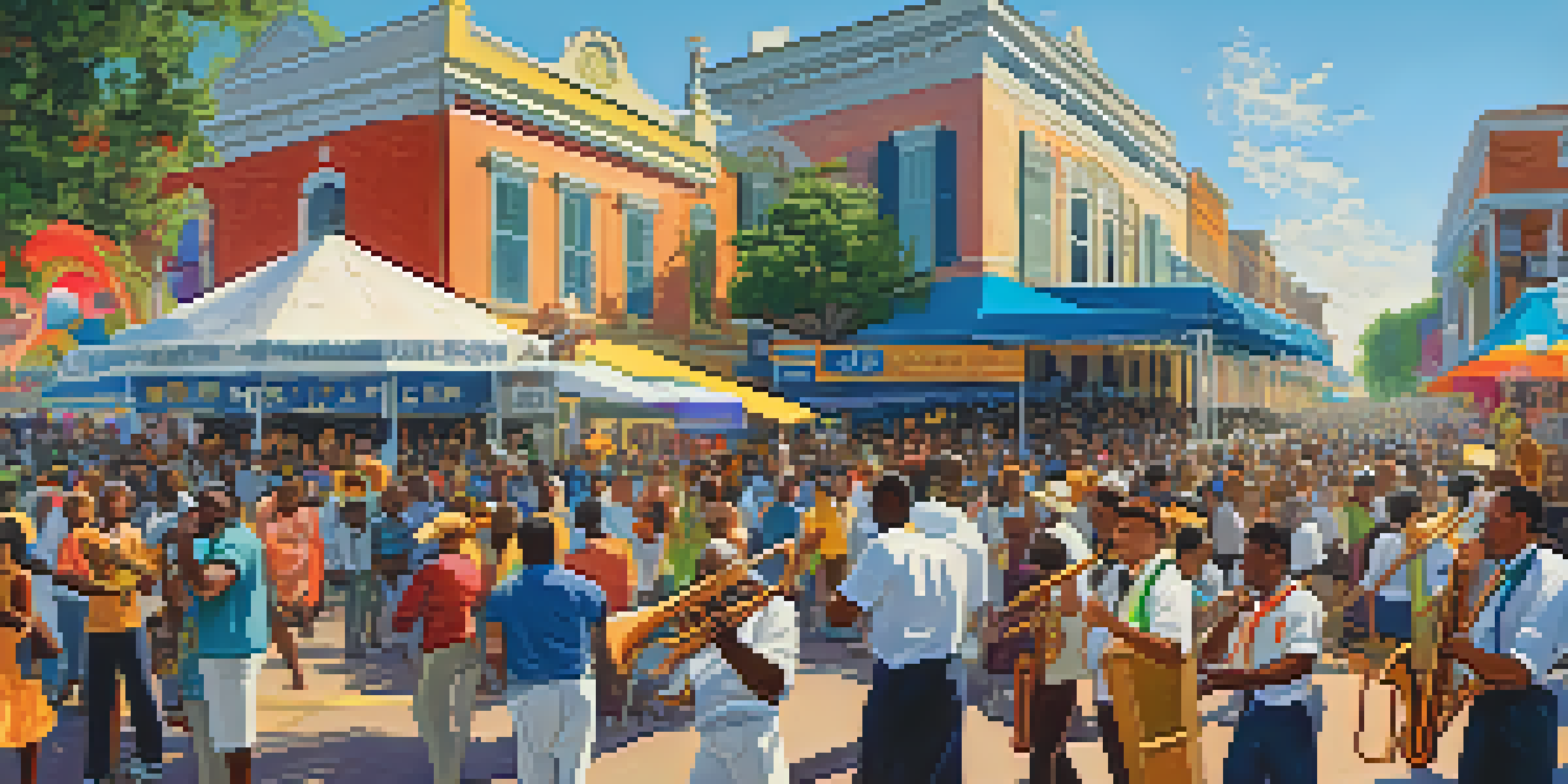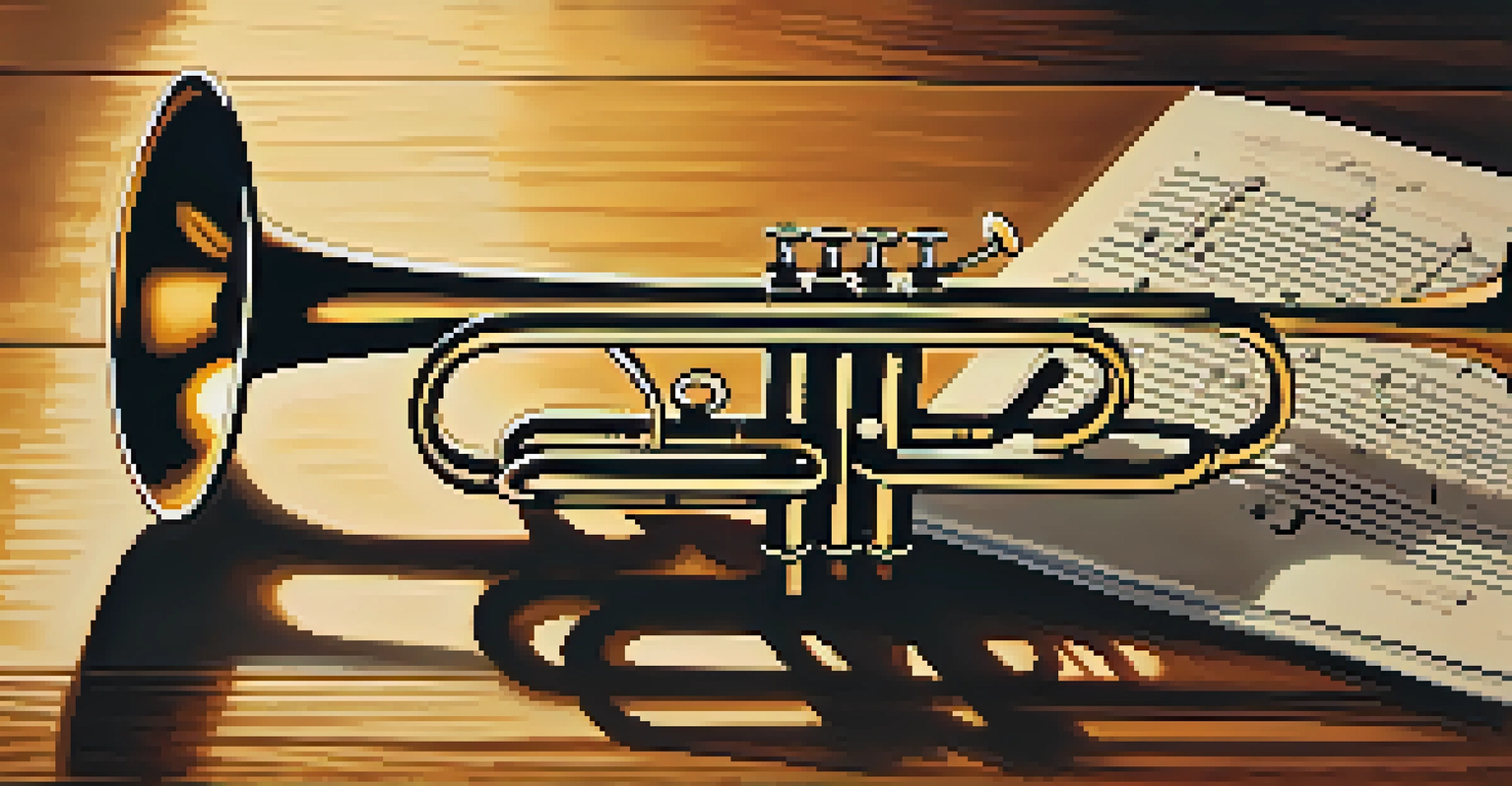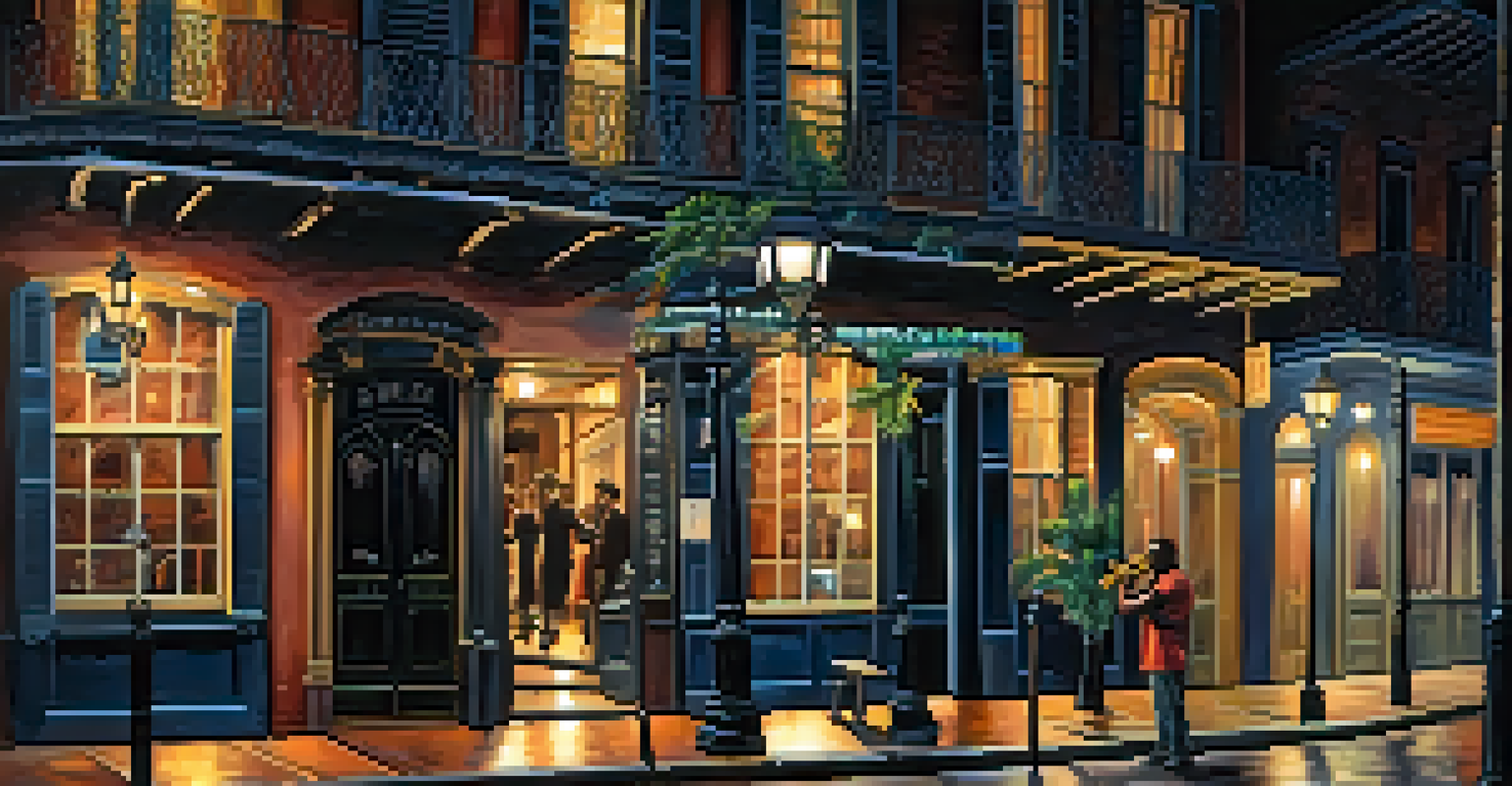New Orleans: The Birthplace of Jazz and Its Global Influence

The Origins of Jazz in New Orleans
Jazz music has its roots deeply embedded in the vibrant culture of New Orleans. In the late 19th and early 20th centuries, the city became a melting pot of diverse musical influences, including African rhythms, blues, and European harmonies. This unique blend created a sound that was unlike anything heard before, setting the stage for the birth of jazz.
Jazz is the big brother of the blues.
The neighborhoods of Storyville and the French Quarter were crucial in nurturing this new genre. Here, musicians gathered in clubs and bars, experimenting with improvisation and syncopation. The lively atmosphere allowed for creative expression, leading to the formation of jazz as a distinct musical style.
As musicians like Louis Armstrong and Jelly Roll Morton emerged from this scene, they brought jazz to life, captivating audiences with their innovative sounds. Their contributions not only shaped the genre but also laid the groundwork for its global expansion.
Key Figures in New Orleans Jazz History
New Orleans has produced numerous iconic jazz musicians who have left an indelible mark on the genre. Louis Armstrong, often hailed as the 'King of Jazz,' revolutionized the way the trumpet was played and elevated the importance of solo performances in jazz. His vibrant personality and unique style helped bring jazz into the mainstream.

Another pivotal figure is Jelly Roll Morton, a composer and pianist who blended ragtime with jazz, creating a sophisticated sound that appealed to a wide audience. His innovative approach not only showcased the complexity of jazz but also influenced countless musicians who followed.
Jazz's Roots in New Orleans
Jazz music originated in New Orleans, blending African rhythms, blues, and European harmonies into a unique sound.
These artists, among many others, became ambassadors of jazz, taking their music beyond New Orleans and introducing it to audiences around the world. Their legacies continue to inspire new generations of musicians and listeners alike.
The Cultural Melting Pot of New Orleans
New Orleans is often described as a cultural melting pot, and this is reflected in its music. The city's rich history of immigration and the African diaspora brought together a variety of musical traditions, creating an environment ripe for innovation. This cultural diversity is a key ingredient in the recipe for jazz.
If you have to ask what jazz is, you'll never know.
As different communities interacted, they shared their unique sounds and rhythms, leading to a dynamic musical landscape. From the African influence in rhythm to the European aspects of melody, the fusion of these elements gave rise to jazz as we know it today.
This cultural confluence not only shaped jazz but also enriched the overall artistic scene in New Orleans. Festivals, parades, and live performances continue to celebrate this vibrant heritage, drawing people from all over the globe.
The Evolution of Jazz Through the Decades
Since its inception, jazz has undergone significant evolution, with New Orleans at its core. In the 1920s, the genre started to spread beyond the city, influenced by the Great Migration as African Americans moved north. Cities like Chicago and New York became new hubs for jazz, but the roots remained firmly planted in New Orleans.
As jazz evolved, so did its styles. The emergence of Dixieland, swing, bebop, and later fusion jazz showcased the genre's adaptability and creativity. Each new style introduced fresh sounds and ideas, yet the spirit of New Orleans remained evident in the music.
Global Impact of Jazz
New Orleans jazz has influenced music worldwide, inspiring new genres and fostering cultural exchanges across the globe.
Today, jazz continues to evolve, incorporating elements from various genres such as rock, hip-hop, and electronic music. This ongoing transformation reflects the genre's resilience and its ability to resonate with contemporary audiences while honoring its origins.
The Influence of Jazz on Global Music
The influence of New Orleans jazz extends far beyond its birthplace, impacting music worldwide. As jazz traveled to different countries, it blended with local musical traditions, giving rise to new genres. This cross-pollination enriched the global music landscape and showcased the universal appeal of jazz.
Countries like Brazil embraced jazz, leading to the development of bossa nova, while in France, jazz became synonymous with the Parisian nightlife of the 1920s. In Africa, musicians incorporated jazz elements into traditional sounds, creating a unique fusion that continues to thrive today.
This global reach highlights how jazz transcends cultural boundaries, uniting people through its rhythm and improvisation. The language of jazz is universal, allowing musicians from diverse backgrounds to connect and collaborate, fostering creativity and innovation.
New Orleans Jazz Festivals and Their Significance
One of the best ways to experience New Orleans jazz is through its lively festivals, which celebrate the genre's rich heritage. The New Orleans Jazz & Heritage Festival, commonly known as Jazz Fest, attracts music lovers from around the world. This annual event showcases not only jazz but also a variety of musical styles, reflecting the city's diverse culture.
Jazz Fest serves as a platform for both established and emerging artists, allowing them to share their talents with a broad audience. It's a celebration of creativity, where attendees can enjoy live performances, delicious local cuisine, and the vibrant spirit of New Orleans.
Preserving Jazz Heritage
Efforts to preserve jazz heritage, through museums and community programs, ensure the genre's legacy continues for future generations.
These festivals play a crucial role in preserving the legacy of jazz while also promoting its evolution. They foster a sense of community among musicians and fans alike, creating a shared appreciation for the art form and ensuring its continued relevance in today’s music scene.
Preserving Jazz Heritage in New Orleans
As jazz continues to evolve, preserving its heritage remains vital for future generations. Institutions like the New Orleans Jazz Museum and the Preservation Hall serve as guardians of this musical legacy. They provide education, resources, and performance opportunities for both new and seasoned musicians.
Community initiatives also play a significant role in keeping the spirit of jazz alive. Programs that offer music education in schools and local workshops help nurture young talent and instill appreciation for the genre. These efforts ensure that the rich history of jazz is passed down and celebrated.

Through these preservation efforts, New Orleans maintains its status as the birthplace of jazz while adapting to the changing musical landscape. The commitment to honoring the past while embracing the future ensures that jazz will continue to thrive, captivating audiences for years to come.